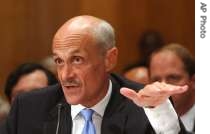-
(单词翻译:双击或拖选)
By Deborah Tate
Washington
12 September 2006
 Secretary Michael Chertoff |
||
----
He told the Senate Homeland Security and Governmental Affairs Committee that the gravest threat facing the United States is one involving weapons of mass destruction.
"A nuclear bomb is at the end of the scale, a biological attack, even a serious radiological attack, would have very, very powerful effects on the entire country. The good news is that a nuclear bomb, the likelihood of that happening, the threat in terms of capability1 is low at this point. On the other hand, I have no reason to believe that that threat is going to diminish over time, and I do have reason to believe it is going to increase over time," he said.
Chertoff says the federal government is taking steps to prevent such a scenario2 by improving intelligence and establishing radiation detection systems.
He says by the end of next year, all cargo3 containers coming from foreign ports will be screened by radiation monitors once they arrive at U.S. ports.
Chertoff says the United States is also working with foreign governments to have cargo scanned before it is loaded onto U.S.- bound ships - an effort that he acknowledges may not be immediately embraced by many countries.
"When containers go through the system that we are proposing to start to deploy4, when they "hit" a red light, the container has to be pulled out and you have to inspect it. The authority to do that lies with foreign governments. We work with them, but it is their authority that we use to open the containers. They rightly worry about the burden on their own customs officials in terms of whether they have the manpower and the capacity to do that," he said.
As Chertoff testified, U.S. Treasury5 officials were briefing another Senate committee about progress made in cracking down on the flow of money to terrorist groups.
Daniel Glaser is the Treasury Department's deputy assistant secretary for terrorist financing and financial crimes. "We have elevated the costs, risks and difficulties for terrorists to raise and move funds in support of their operations," he said.
But Glaser acknowledged more needs to be done.
The committee's chairman, Senator Richard Shelby, an Alabama Republican, agreed, saying terrorists have shown the ability to adapt. "Charities closed by governments have resurfaced under new names. Exploitation of formula banking6 systems have been replaced by the increasing use of bulk cash couriers. And of particular concern to this committee, the use of shell and front companies continue to constitute a serious weakness in even our own anti-money laundering7 and terror finance regulatory regimes," he said.
In its latest action Friday, the Treasury Department barred Iran's state-run Bank Saderat from having any links with U.S.-owned banks, citing what it called the bank's support for terrorism.
 收听单词发音
收听单词发音
1
capability

|
|
| n.能力;才能;(pl)可发展的能力或特性等 | |
参考例句: |
|
|
|
2
scenario

|
|
| n.剧本,脚本;概要 | |
参考例句: |
|
|
|
3
cargo

|
|
| n.(一只船或一架飞机运载的)货物 | |
参考例句: |
|
|
|
4
deploy

|
|
| v.(军)散开成战斗队形,布置,展开 | |
参考例句: |
|
|
|
5
treasury

|
|
| n.宝库;国库,金库;文库 | |
参考例句: |
|
|
|
6
banking

|
|
| n.银行业,银行学,金融业 | |
参考例句: |
|
|
|
7
laundering

|
|
| n.洗涤(衣等),洗烫(衣等);洗(钱)v.洗(衣服等),洗烫(衣服等)( launder的现在分词 );洗(黑钱)(把非法收入改头换面,变为貌似合法的收入) | |
参考例句: |
|
|
|















